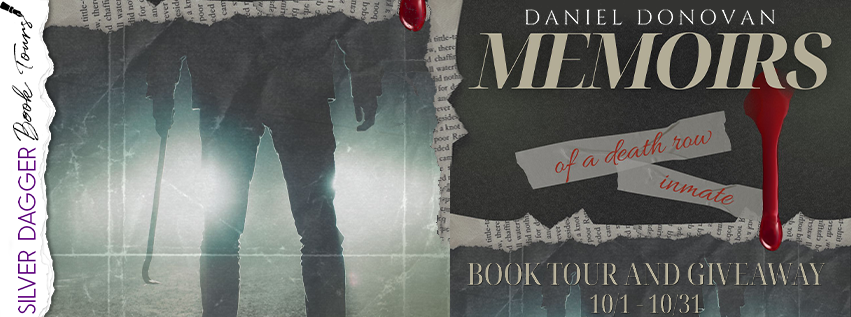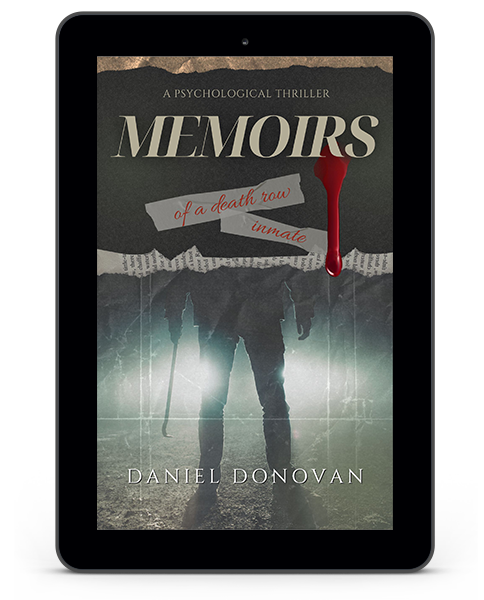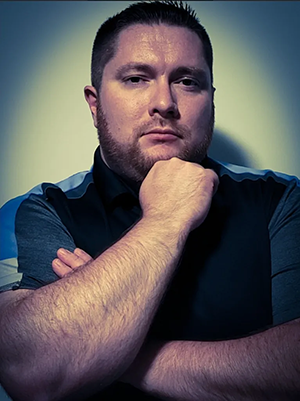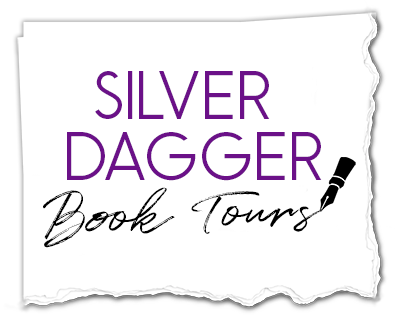When you stare into the face of evil, don't flinch.
Memoirs of a Death Row Inmate
by Daniel Donovan
Genre: Psychological Thriller
James Bryant is a relatively unknown detective with an otherwise average career. But for one detail: he caught a notorious serial killer from the Midwest. A psychopath, dubbed the South Side Sadist, Richard Allen Fenton, is locked up in the El Dorado Correctional Facility, awaiting his execution on Christmas day. Though a relatively unknown serial killer, Fenton is a master of manipulation whose killing spree lasted over three decades, spanned five states, and claimed eleven victims...so far. Although the two have not been in the same room since the final appeal, Fenton has one more game to play. Striking a deal with the Department of Justice, Fenton agrees to reveal the identities and locations of his other victims. He asks for only one thing in return; to have the cop who put him away take down a series of confessions, find the bodies, and write all of Fenton's misdeeds into a three-volume set to be published for the world to see.
Bryant, a functioning alcoholic battling his own demons, is offered a choice; take the deal or hand in his badge. Against his will and at the detriment of his ever-degrading mental health, Bryant agrees. Backed by a task force with the FBI, Bryant is forced into weekly meetings at the Correctional Facility with Fenton, who torments Bryant at every turn. While Bryant thinks he is just "serving his time," Fenton has other ends in mind. In their regularly scheduled meetings in the prison, Fenton tortures Bryant with the horrifying details of his murderous career, while an unhinged disciple of Fenton's seeks to wreak havoc on the task force on the outside. In prison or out, Bryant fights to stay one step ahead of the killers as they seek to destroy his life and that of everyone around him.
**On Sale for October -
Get 20% off the Paperback listed at 19.99 & 40% off the ebook listed at 7.99!**
Amazon * B&N * Bookbub * Goodreads
Twenty minutes; that’s how long it took to get from the front door, through security and down to maximum lock-up. They had a special interview room set up for me to use. I was glad they did, because I didn’t want to walk down the hall past Dennis Rader, the Carr brothers, and a long line of other sick individuals just to talk with the sickest of them all. The hallway leading to the room was even more depressing than the entryway. It was meant to contain hardened criminals who were so fucked up they kept the lights as dim as possible to hide the glow of insanity radiating from their eyes. This was no place for any decent human being to spend their time. The lights only got dimmer the further I walked down the hallway. The lights flickered, creating an ominous atmosphere punctuated only by the soft voices of the incarcerated, carrying from their various cells. Ahead of me, a three inch thick metal door complete with a six by six inch impenetrable glass window at head height waited for me. My heart started racing, and my throat tightened.
I could see, through the small shatterproof glass window leading into the interview room that the source of my pain was waiting for me inside. A chill ran down my spine as the electronic lock popped allowing the door to slide open. The man chained to the table didn’t turn to acknowledge me as I stepped into the room.
“I’ll be right outside in case he tries anything,” the guard cautioned. I nodded to him and stepped along the left wall. I circled the room until I was on the opposite side of the table from the man in the brown prison jumpsuit. I leaned back against the wall and set the briefcase down beside me.
I finally raised my eyes to meet those of my cell-mate. Behind black and gray, bushy eyebrows shone the dark brown eyes of malice, radiating from the face of pure evil. The large figure was partially hidden by long, unkempt salt and pepper hair, hanging along either side of his face and obscuring his hulking shoulders. The face, if clean shaven, would have caused most people to flinch and look away; the beard, fortunately, hid some of the menacing lines of his permanent smirk. He sat with his hands cuffed together and the handcuff chains ran through a ring on the table, keeping his hands together. He laced his fingers from one hand through the fingers of the other and stared as if he was contemplating his next ten moves.
Do you see writing as a career?
The beauty of writing is that it can be done to fill a myriad of roles, any amount of time, and for almost any purpose. I process my thoughts better when they are written down. It is also a style of learning for some people. Writing can be done to fill your time, accomplish your goals or create worlds for readers to lose themselves for hours at a time. I absolutely see writing as a career. The genius of the craft is that it can be done in your free time, as a paid contributor, or as a means of honing your skills as you put in the work to be the best writer possible so someday, just maybe, someone will connect so much with your book that they want to publish it for the world to read. If you are among the lucky, the waves of creativity never wain, allowing a writer to start out in the evenings after they get home from work to spending any moment they wish producing stories to enchant, entertain, and encourage readers the world over.
What do you think about the current publishing market?
Publishing has become slightly overshadowed by personal and political opinions. Anyone who doesn’t toe the line is unlikely to be published through the large publishing houses. Publishing agencies suffer in the same way. This ultimately led me to self-publish my book. Everywhere I looked I saw organizations that spat upon and scorned the very career which inspired and spawned the story I was trying to tell. Many writers would sign on to anyone who would have them. I think it requires enough integrity to say, “Even if you could help me succeed, I will not jump in bed with someone who despises my origin, my career, my God, or me.” I would rather self-publish every book I ever write than partner with an organization buried so far up to their necks in radical, biased, political ideology, that they would never consider if what they believe is factual, moral, ethical, or what is best for society.
Do you prefer to write in silence or with noise? Why?
Most of the times I require almost complete silence. This has frequently been impossible living in an apartment or duplex with noisy neighbors or even a wife who enjoys watching television at a reasonable volume. To cope, I invested in basic headphone and started listening to rock and heavy metal music. It made me realize this was often the strategy I would use typing a paper on my home computer for high school with four siblings running around the house. The music centers me and provides me with energy and a sense of calm that allows me to sit in place and type for hours at a time. When I was on the final push to finish writing Memoirs of a Death Row Inmate, I would write for 20-30 hours a week. Music made it all possible.
Do you write one book at a time or do you have several going on?
I wish I had the focus to only have one story running through my head at a time. Having 16 books lined up after Memoirs of a Death Row Inmate tells me I have more creativity than I have time to commit to the bulk of the writing. The beauty of this problem is that my enthusiasm builds for each project over time allowing me to write down notes, develop character arcs, create conflicts for hero’s to overcome, and find ways to help people through my writing even more. I focus the majority of my attention to one project at a time, but I have notepads and note apps on my phone littered with plot points, ideas and book ideas to keep the ideas flowing fresh at all times.
Pen or type writer or computer?
Computer! My handwriting is abysmal and a typewriter is impractical for the volume of editing and correcting I have to do at any given time.
Advice they would give new authors?
Start writing! That’s it, that’s the advice. To be a writer simply means you need to write. Try to write every day; even a single sentence. Get an old-timey tri-fold poster board like you might have used for a presentation or display in high school and cover it with sticky notes. Find tools to help you structure, format and diagram your story. My two favorites are my “Writer’s Block,” which is literally a blank, hardback notebook whose cover looks like wood grain. I jot my ideas into the “Writer’s Block” and review my ideas from time to time to see if I can expand on them. I also use a resource called “Writer’s Workbook, A Personal Planner with Tips, Checklists and Guidelines” by Tanya Hanika. It has so many helpful items like a timeline, character profiles, chapter summaries, Checklists for the first draft, Marketing and Social media plans and blog tours so you can keep track of everything you are doing and need to do. The mistake I made with my first real project over ten years ago was that I just started writing and made it up as I went. You don’t need every detail, but you have to know where you are going and how you will get them. Let the story grow and change along the way, but have structure to direct the storyline. If you don’t you will write yourself into a corner, misname a character later in the book, and forget an entire subplot for so long you can’t figure out where to fill it in to make sure the storylines intersect when necessary.
What is your writing process?
My stories usually start from a single scene; often the result of a dream. From the dream I make notes and start pondering how I could take something so odd and out of place and turn it into a story. I think my goal is to make sense out of something which, at the time, makes no sense. From there I do my best to determine where I want the story to go and how I want it to end. Then the fun part is figuring out how to get the main character to the end of the book. This is a fun challenge and helps provide me with the sense that I am the one on the journey, not just the protagonist. I might diagram the chapters and do a full outline, but often this has to come together over time. I will often write until I hit a wall, then spend an inordinate amount of time figuring out how the character could feasibly get through the problem they face. This sometimes takes hours, days or months with no rhyme or reason. To break this log jam I will read everything I have up until that point over and over again, editing along the way until I figure it out and can move forward with the story.
What are common traps for aspiring writers?
Lack of planning, structure to their process and trying to keep all the information in their head where it gets jumbled and confusing. Put your ideas on paper. Spread them out so you can see them, review them regularly, and make sense out of it all.
Do you try more to be original or to deliver to readers what they want?
I am focused one hundred percent on being original. In my early works I tried to write with the reader in mind. This meant I was writing a story for some random person I hadn’t met or some person I knew who might have an opinion of my work that mattered more than my own. I had to cut that way of thinking off and plant it six feet underground. I discovered if I write a book so interesting that it keeps me enthralled in the writing, it will likely have the same impact on the reader. I don’t know what everyone wants to read, what will offend them, or what will make them keep coming back. I just know if I try to please everyone I will end up pleasing no one, not even me.
How long on average does it take you to write a book?
My first book took me nearly three years, but I was easily distracted back then and I was writing to be liked and not to tell a story I loved. “Memoirs of a Death Row Inmate” is 456 pages and 35 chapters. It took me two years the write the first nine chapters when I lacked structure, planning and intentionality. The last twenty-six chapters took me five months. That is the difference between structured writing and aimless writing. The speed at which the words land on the page is directly impacted by the clarity you have on where you are in the story, where you are going, and how you are going to get there. Without having those set up ahead of time, you are going to struggle to write in a timely manner. I saw a panel discussion where Steven King talked about writing six pages a day. That might seem like a lot or a little depending on your pace, but if you are trying to write effectively, set a goal for how much content you want to produce each day, week, or month. Six pages a day, the average fiction writer could finish four to six books each YEAR! Six pages may be impractical for those of us with day jobs, but a serious goal that pushes you to write as much as possible in a given time-span is going to benefit you significantly.
Daniel Donovan was born in Missouri and raised in Kansas for most of his life. He always had a passion for creative writing, but it wasn’t until he spent four years in law enforcement that the spark for crime thrillers was really ignited. Donovan aims to bring his readers into the novel by incorporating real-life details into his works of fiction while giving readers the thrills and chills they seek.
Website * Facebook * Twitter * Instagram * Amazon * Goodreads
Follow the tour HERE for special content and a giveaway!









This story sounds like a really good thriller. Thanks for sharing.
ReplyDeleteI like thrillers like these. Thanks for hosting this.
ReplyDeleteThanks for the giveaway opportunity
ReplyDelete